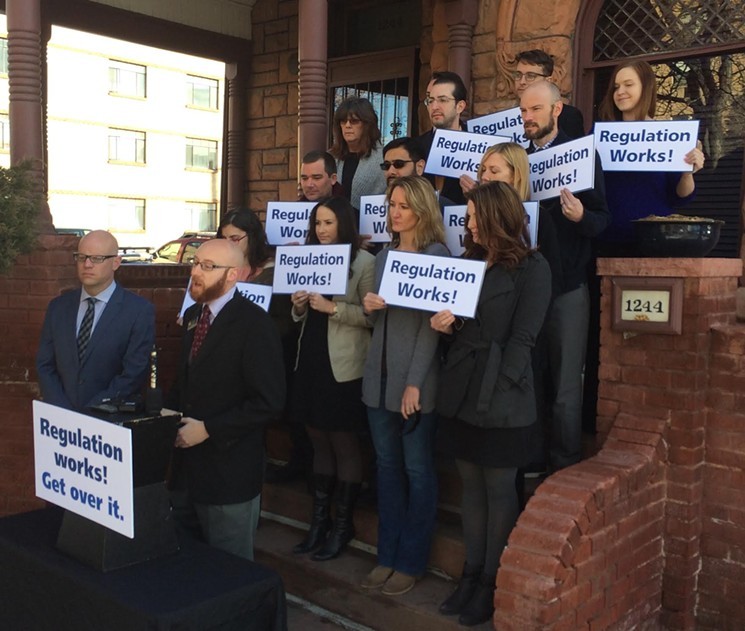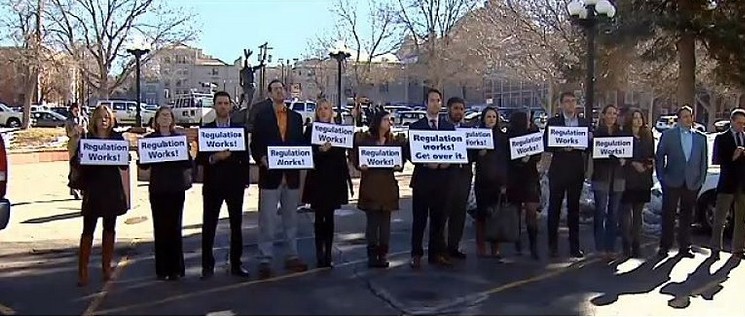A lawsuit filed by two Colorado landowners who claim that a nearby marijuana grow has reduced their property values in part because the smell makes horseback riding less pleasant goes to trial in Denver federal court today. And the repercussions of the suit's strategy, based on federal racketeering laws, could have far-reaching effects on the cannabis industry in Colorado and beyond.
The case was filed in February 2015 by Safe Streets Alliance, a national anti-pot group, on behalf of two members, Phillis Windy Hope Reilly and Michael P. Reilly. Early on, the effort didn't seem particularly professional: Note that the organization misspelled marijuana as "marajuana" in its initial press release on the subject. But SSA's success in court over the past three years-plus has overcome this gaffe.
The lead defendant is Alternative Holistic Healing, LLC — although the original lawsuit, accessible below, doesn't get around to talking about the Reillys' specific beefs with that outfit until page 25 of the document.
The married couple own three lots in a Rye, Colorado, development called the Meadows at Legacy Ranch — "approximately 105 acres of beautiful rolling pasture with sweeping mountain vistas that include views of Pike's Peak," the suit notes. And while they don't actually live on the land, they like to visit there on the weekends so that their kids can ride horses and hike.
A marijuana grow owned by Alternative Holistic Healing is adjacent to the Reillys' property, at 6480 Pickney Road — and that's a problem, the suit maintains, because "growing recreational marijuana is 'noxious, annoying or offensive activity' by virtually any definition because marijuana plants are highly odorous, and their offensive smell travels long distances." Hence, the suit maintains, the grow violates assorted covenants governing Meadows at Legacy Ranch, thereby impinging on their ability to enjoy their land as they'd like.
On top of that, the sight of a building under construction on the grow site "exacerbates the injury, for when the Reillys and their children visit the property, they are reminded of the racketeering enterprise next door every time they look to the west."
The suit also maintains that the grow has hurt property values — plus, "the large quantity of drugs at marijuana grows makes them targets for theft, and a prospective buyer of the Reillys’ land would reasonably worry that the 6480 Pickney Road marijuana grow will increase crime in the area."
At the time of the filing, we reached out to attorney Thomas Walsh for his views on the merits of the suit. He was unpersuaded by most of the Reillys' claims, but acknowledged that the pair and Safe Streets Alliance "have done a good job of linking many of the different players who play a role in the licensing and operation of a marijuana business," including Governor John Hickenlooper, various state officials with the Department of Revenue and the Marijuana Enforcement Division, the Pueblo County Commission, the owner of the land upon which the grow facility was being built, the business itself, the construction company building it, the insurance company that issued its surety bond, and the owner of a company that would transport water to the grow.

Attorney David Thompson represented Safe Streets Alliance at the lawsuit's initial hearing. He's scheduled to be in U.S. District Court today.
CBS4 file photo
"RICO is founded on the concept of racketeering activity. The statute defines ‘racketeering activity’ to encompass dozens of state and federal offenses, known in RICO parlance as predicates. These predicates include any act ‘indictable’ under specified federal statutes,' and among them is 'drug-related activity that is ‘punishable’ under federal law.' As relevant here, 'racketeering activity' includes 'dealing in a controlled substance or listed chemical as defined in' the CSA [Controlled Substances Act]. Racketeering activity also includes 'any offense involving...the felonious manufacture, importation, receiving, concealment, buying, selling, or otherwise dealing in a controlled substance or listed chemical,' as defined in the CSA, that is 'punishable under any law of the United States'....
It follows, therefore, that operating a marijuana cultivation facility of the type the Reillys described in their Second Amended Complaint necessarily would involve some racketeering activity. As just one example, cultivating marijuana for sale — which the Marijuana Growers admit they agreed to do and they allegedly began and are continuing to do — is by definition racketeering activity. We conclude the Reillys have adequately alleged that the Marijuana Growers are each engaged in racketeering activity.

Representative Jonathan Singer was among the speakers at a 2015 press conference by marijuana regulation supporters that was spurred by the suits.
Courtesy of the Marijuana Policy Project
“Colorado has demonstrated that regulating marijuana works. Our state has enacted sensible and strict regulations, developed through an inclusive stakeholder process, to ensure quality-controlled marijuana is available through safe and secure businesses. These businesses are run by individuals who are active, contributing, and taxpaying members of the community.Proceedings in the case get under way at 8 a.m. today, October 29, in U.S. District Court's Alfred A. Arraj Courthouse Annex, 9901 19th Street, courtroom A-1001, under the auspices of Judge Robert E. Blackburn.
“This lawsuit is intended to undermine a set of laws and regulations specifically designed to make our communities safer. We are in the process of eliminating the underground marijuana market in this state. It’s disappointing to see outsiders coming into Colorado with the goal of reversing our progress.”
Click to read the original lawsuit, Safe Streets Alliance, et al., v. Alternative Holistic Healing, LLC, et al.













